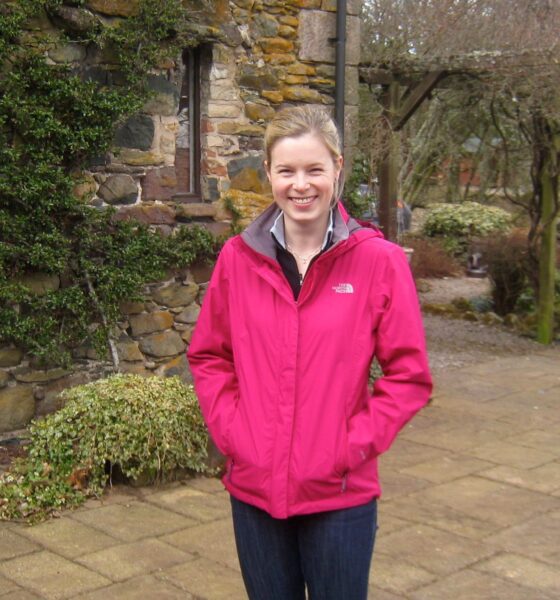

Economy
Future sustainability leaders: Kate Beattie
What will business look like in the future and who are our future leaders?
This is the next instalment in our series speaking with a group of young people who are making waves in sustainability. All 12 are scholars on Forum for the Future’s renowned master’s course in leadership for sustainable development.
Kate Beattie has turned her concern for the environment, which she picked up while on a gap year in Fiji, into a passion about making society more sustainable. Here, she tells us about some of the key lessons she has learnt over the past year.
Tell us about your experience on the Forum for the Future master’s course. What have your placements involved?
I picked the Forum for the Future master’s for the work experience element, to help kickstart my career and try working in different sectors and organisations. My placements at the Fairtrade Foundation, Ecover, Kirklees council and FTSE have been varied and interesting, and I have learnt a huge amount about sustainability in the real world, as well as gaining some invaluable skills and meeting some great people along the way.
Though the work experience has been an amazing opportunity, the best bit about the course has been my time at Old Street with the other scholars. Being part of such a close knit group, all passionate about sustainability, though often with slightly different views, has been highly rewarding. The sheer variety of lectures, workshops, debates and field trips has opened my eyes to new ideas and I have learnt a lot about myself and my abilities, too. Overall, it’s been a highly enjoyable, if slightly crazy, 10 months and I feel ready to tackle the next adventure.
Where does your interest in sustainability come from?
My sustainability interest stems from volunteering on a coral conservation project in Fiji on my gap year. I fell in love with the ocean and couldn’t believe that island communities would use dynamite and chemicals to fish, even though it meant destroying what they relied on for food. I have always had a love of nature, but this was the first time I really thought about the impact we are having on the planet.
More recently, whilst learning about sustainability focused businesses at university and the power they have to make a difference, the concern turned into a passion to do something about it.
What is the best piece of advice you’ve been given during your course?
The best advice I’ve had from the course has been from my fellow scholars during our time with the Leadership Trust. Three hundred and sixty-degree feedback on our strengths and weaknesses, along with discussion and reflection time, gave me the opportunity to learn a lot about myself and how I interact with others.
The best specific bit of learning from that process was that if you can have an open, honest working relationship with others, things will get done quicker and you’ll all be happier.
What’s most important business lesson you’ve learnt?
That’s a tricky one… Maybe that being able to talk the talk and make a good, confident first impression can be vital when working with corporates.
What one idea do you think could change the world for the better?
I would really like to say teleportation, but I suppose I should be more realistic. The next best thing for me would be an alternative way to measure national output that drives us towards a happier, healthier global society. If we can work out a way to use happiness economics instead of GDP, I think that would be a really positive step for mankind and would mean policy aimed at what is really important in life for people to be happy, rather than trying to achieve continued growth, which we know cannot continue long-term.
What do you see of the future in terms of sustainability, business and the environment?
The future will have to be sustainable because we won’t have a choice. Businesses are already starting to live up to this and realise that they need to change to survive and even the financial sector is showing signs of taking sustainability much more seriously. This positive change gives me hope for a future whereby business works in harmony with nature and people, and even aims to make a positive impact to improve our planet. However, there is still a long way to go and I hope this shift happens fast enough to prevent huge loss of life and natural habitats.
Where will you be in 10 years’ time?
I’m really passionate about creating sustainable and ethical supply chains so I would like to be doing something on that. I’m also equally keen to help clean up the oceans somehow or get involved in a community farming project.
I guess I’m not really sure where I’ll be in 10 years, as there is so much of interest to me, but overall I hope to be working to create a more sustainable world in a job I love because I feel like I’m making a difference. On top of that, though maybe a little quaint, I hope to have a house and family in the country to enjoy the great outdoors and grow my own food.
Further reading:
Future sustainability leaders: Maia Tarling-Hunter
Future sustainability leaders: Ruth Shave
Future sustainability leaders: Angela Green
Future sustainability leaders: Andrew Adam
Future sustainability leaders: Zoe Draisey
Future sustainability leaders: Rebecca Trevalyan


 Environment12 months ago
Environment12 months agoAre Polymer Banknotes: an Eco-Friendly Trend or a Groundswell?

 Features11 months ago
Features11 months agoEco-Friendly Cryptocurrencies: Sustainable Investment Choices

 Features12 months ago
Features12 months agoEco-Friendly Crypto Traders Must Find the Right Exchange

 Energy11 months ago
Energy11 months agoThe Growing Role of Solar Panels in Ireland’s Energy Future




























